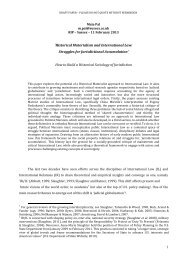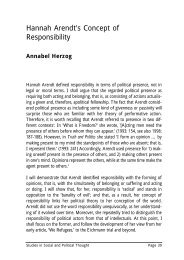Civil Society Theory and Euro-Nationalism - University of Sussex
Civil Society Theory and Euro-Nationalism - University of Sussex
Civil Society Theory and Euro-Nationalism - University of Sussex
Create successful ePaper yourself
Turn your PDF publications into a flip-book with our unique Google optimized e-Paper software.
CIVIL SOCIETY THEORY AND EURO-NATIONALISM<br />
contemporary liberal <strong>and</strong> post-Marxist theory purges the concept<br />
<strong>of</strong> the critical elements <strong>of</strong> state, political economy <strong>and</strong> class conflict.<br />
In this conception civil society is ‘a collection <strong>of</strong> uniform, atomised<br />
<strong>and</strong> solitary individuals’. 53<br />
With this purging <strong>of</strong> the concept the limits <strong>of</strong> the analytical<br />
distinction between politics <strong>and</strong> sociology become apparent.<br />
Indeed, the political power <strong>of</strong> civil society theory, as conservative<br />
rhetoric, lies in the very act <strong>of</strong> de-politicising history. Instead <strong>of</strong> an<br />
‘emerging bourgeoisie’ (which for all its crudity implied a political<br />
history) we have the inevitable emergence <strong>of</strong> civil society as a<br />
function <strong>of</strong> progress. However, on closer inspection, ‘progress’<br />
turns out to be the rationalisation <strong>of</strong> society by the state <strong>and</strong> the<br />
liberation <strong>of</strong> the economy from the influence <strong>of</strong> anything other<br />
than the internal logic <strong>of</strong> the market. 54<br />
The mixture <strong>of</strong> descriptive sociological <strong>and</strong> moral intent may have<br />
varied in the theorisation <strong>of</strong> civil society up to <strong>and</strong> including Marx,<br />
but it maintained a necessary link between political discourse <strong>and</strong><br />
descriptive sociology. Contemporary theorisation however, since<br />
the re-emergence <strong>of</strong> the concept in the 1980s, has taken a distinctly<br />
idealist turn. This has been combined, somewhat paradoxically,<br />
with a pragmatism which privileges activism <strong>and</strong> looks to ‘the statecivil<br />
society schema ... as a criterion to establish what must be done<br />
... in order to reach a goal whose desirability is taken for granted ’. 55<br />
The ideological pitfalls inherent in this combination <strong>of</strong> idealismactivism<br />
<strong>and</strong> anti-theory will now be now explored through the<br />
notion <strong>of</strong> an analytical distinction between political discourse <strong>and</strong><br />
descriptive sociology. A ‘political’ conception <strong>of</strong> civil society<br />
might be said to differ from a ‘descriptive sociological’ one in that<br />
it starts from abstract notions <strong>of</strong> ‘ought’ rather than empirical<br />
observation. However, it is a commonplace <strong>of</strong> contemporary<br />
53 Giner, Carta sobre la Democracia.<br />
54 For example, one speaker on the Catalan television programme ‘Preguntes amb<br />
resposta: El Petroli. Fins quan?’ voiced the fairly widely held conviction that,<br />
‘the market is democracy’ (Canal 33, 21.10.2000).<br />
55 J. Keane, <strong>Civil</strong> <strong>Society</strong> <strong>and</strong> the State. London: Verso, 1988, p. 21. My emphasis.<br />
47
















